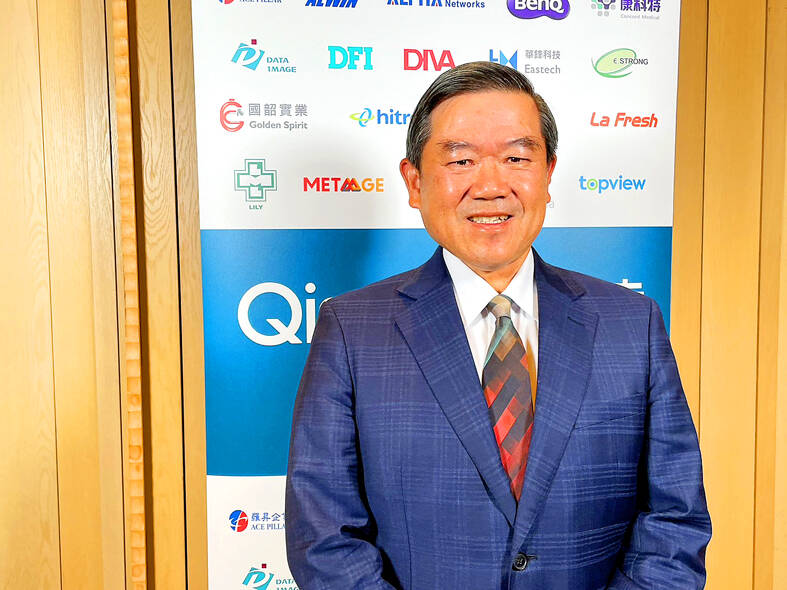Electronics manufacturer Qisda Corp (佳世達) yesterday posted another quarter of inventory destocking as gross margin last quarter hit the highest level in 20 years, with executives saying that market supply and demand has gradually been restored, but is yet to significantly recover.
The company’s inventories totaled NT$35.8 billion (US$1.13 billion) in the second quarter, down by NT$20.4 billion from a year earlier and a decrease of NT$3.8 billion from the previous quarter.
“Inventory amount has decreased for five consecutive quarters,” Qisda chief financial officer Jasmin Hung (洪秋金) said at an investors’ conference.

Photo: Chen Mei-ying, Taipei Times
Gross margin, a key gauge of profitability, reached 16.3 percent last quarter and totaled 16.1 percent in the first half of the year, both the highest in 20 years, Hung said, citing a continued improvement in the company’s information technology (IT) business and steady contributions from new ventures with high added value.
Qisda manufactures IT products, consumer electronics and networking and communications devices. It also provides smart business solutions and has cultivated a high-margin medical business, with hospital operations having recovered significantly this year.
The company’s consolidated revenue last quarter increased 3.3 percent quarter-on-quarter to NT$52.11 billion thanks to contributions from new high-added-value businesses, although quarterly revenue decreased 17.01 percent from the same period last year.
Net profit surged 216 percent quarterly and rose 4.3 percent annually to NT$1.02 billion in the second quarter on the back of nonoperating gains of NT$660 million, the company said.
Earnings per share were NT$0.53 in the April-to-June period, lifting them for the first half to NT$0.69, it said.
Qisda chairman Peter Chen (陳其宏) said he remained confident in sales performance this quarter, with revenue this month predicted to be higher than last month, and next month would also be better than this month.
However, “the prospects for the fourth quarter are not as good as expected, and the visibility of the industry remains relatively low,” Chen said.
Qisda said demand for IT products, mainly monitors and projectors, is gradually picking up and the company’s medical business is expected to be an important growth driver in the third quarter.
Both the business solutions and networking and communications segments are expected to benefit from long-term demand for digital transformation and IT infrastructure, although they would still undergo inventory adjustments in the short term, the company said.
Overall, the company said it is cautiously optimistic about the second half of the year, but would pay extra attention to external uncertainties, such as global inflation, central banks’ monetary tightening, geopolitical tensions and slowing market demand.

A proposed 100 percent tariff on chip imports announced by US President Donald Trump could shift more of Taiwan’s semiconductor production overseas, a Taiwan Institute of Economic Research (TIER) researcher said yesterday. Trump’s tariff policy will accelerate the global semiconductor industry’s pace to establish roots in the US, leading to higher supply chain costs and ultimately raising prices of consumer electronics and creating uncertainty for future market demand, Arisa Liu (劉佩真) at the institute’s Taiwan Industry Economics Database said in a telephone interview. Trump’s move signals his intention to "restore the glory of the US semiconductor industry," Liu noted, saying that

On Ireland’s blustery western seaboard, researchers are gleefully flying giant kites — not for fun, but in the hope of generating renewable electricity and sparking a “revolution” in wind energy. “We use a kite to capture the wind and a generator at the bottom of it that captures the power,” said Padraic Doherty of Kitepower, the Dutch firm behind the venture. At its test site in operation since September 2023 near the small town of Bangor Erris, the team transports the vast 60-square-meter kite from a hangar across the lunar-like bogland to a generator. The kite is then attached by a

Foxconn Technology Co (鴻準精密), a metal casing supplier owned by Hon Hai Precision Industry Co (鴻海精密), yesterday announced plans to invest US$1 billion in the US over the next decade as part of its business transformation strategy. The Apple Inc supplier said in a statement that its board approved the investment on Thursday, as part of a transformation strategy focused on precision mold development, smart manufacturing, robotics and advanced automation. The strategy would have a strong emphasis on artificial intelligence (AI), the company added. The company said it aims to build a flexible, intelligent production ecosystem to boost competitiveness and sustainability. Foxconn

Leading Taiwanese bicycle brands Giant Manufacturing Co (巨大機械) and Merida Industry Co (美利達工業) on Sunday said that they have adopted measures to mitigate the impact of the tariff policies of US President Donald Trump’s administration. The US announced at the beginning of this month that it would impose a 20 percent tariff on imported goods made in Taiwan, effective on Thursday last week. The tariff would be added to other pre-existing most-favored-nation duties and industry-specific trade remedy levy, which would bring the overall tariff on Taiwan-made bicycles to between 25.5 percent and 31 percent. However, Giant did not seem too perturbed by the